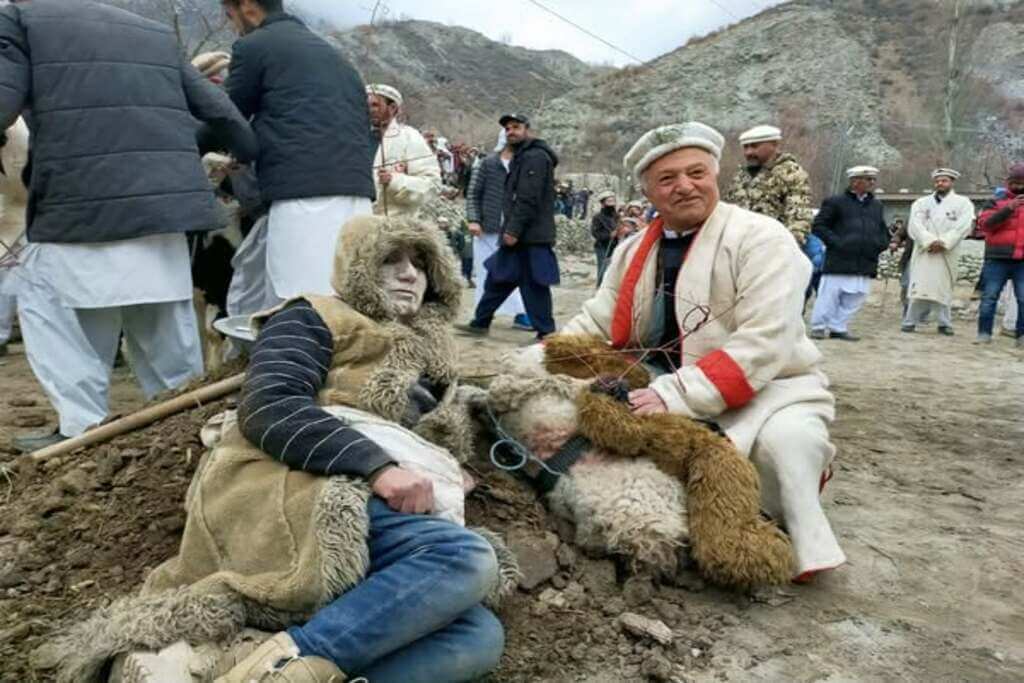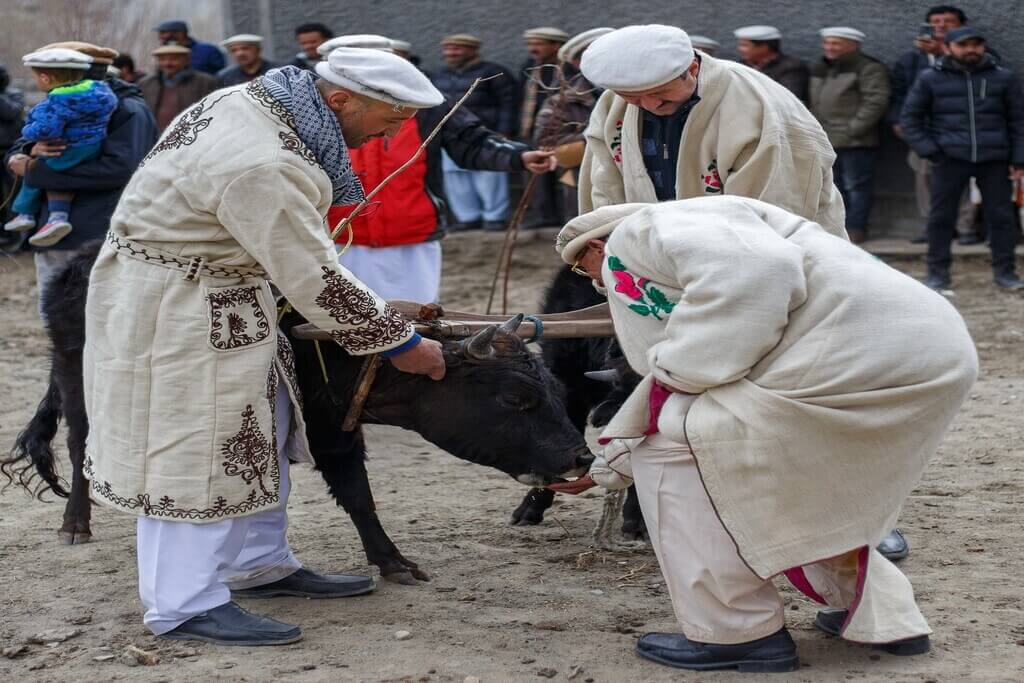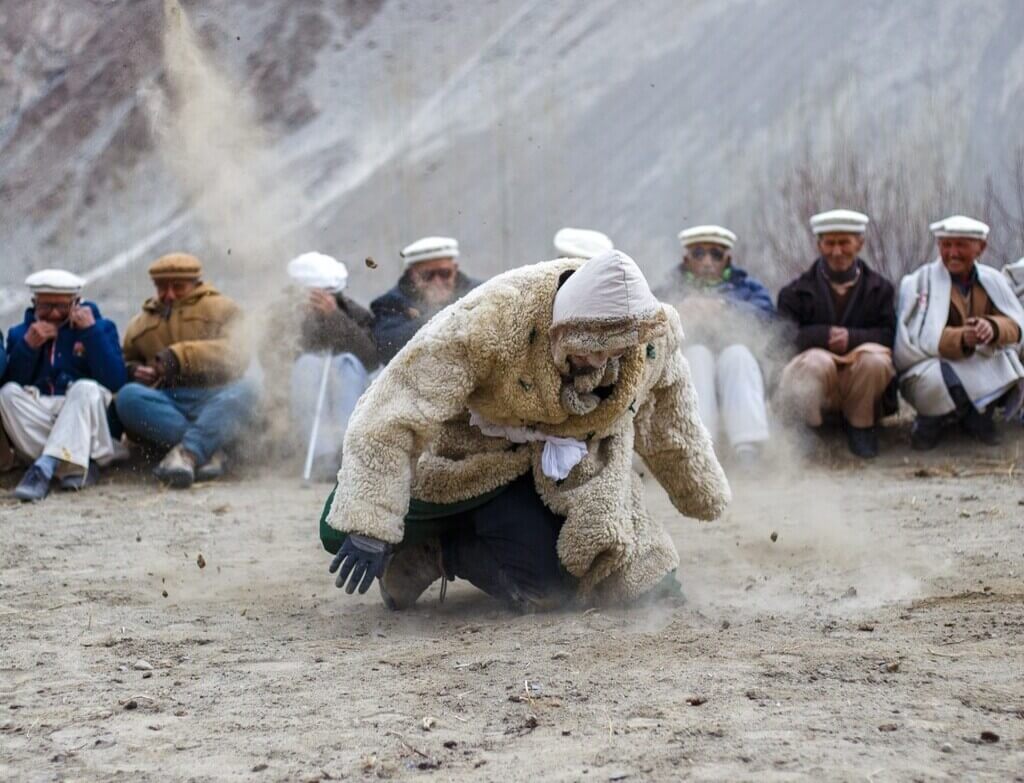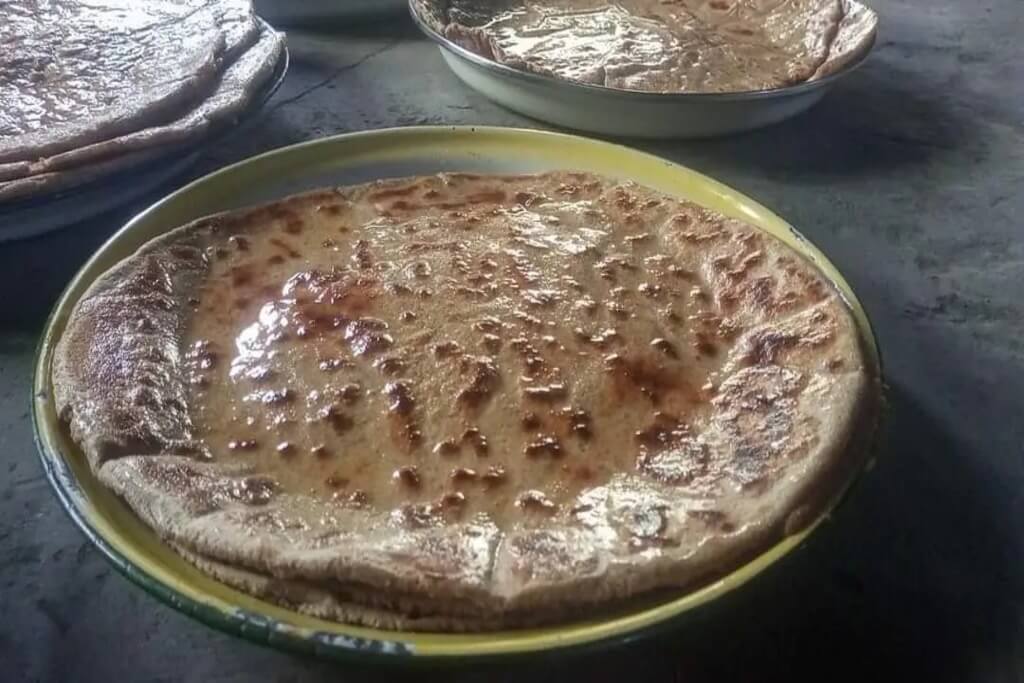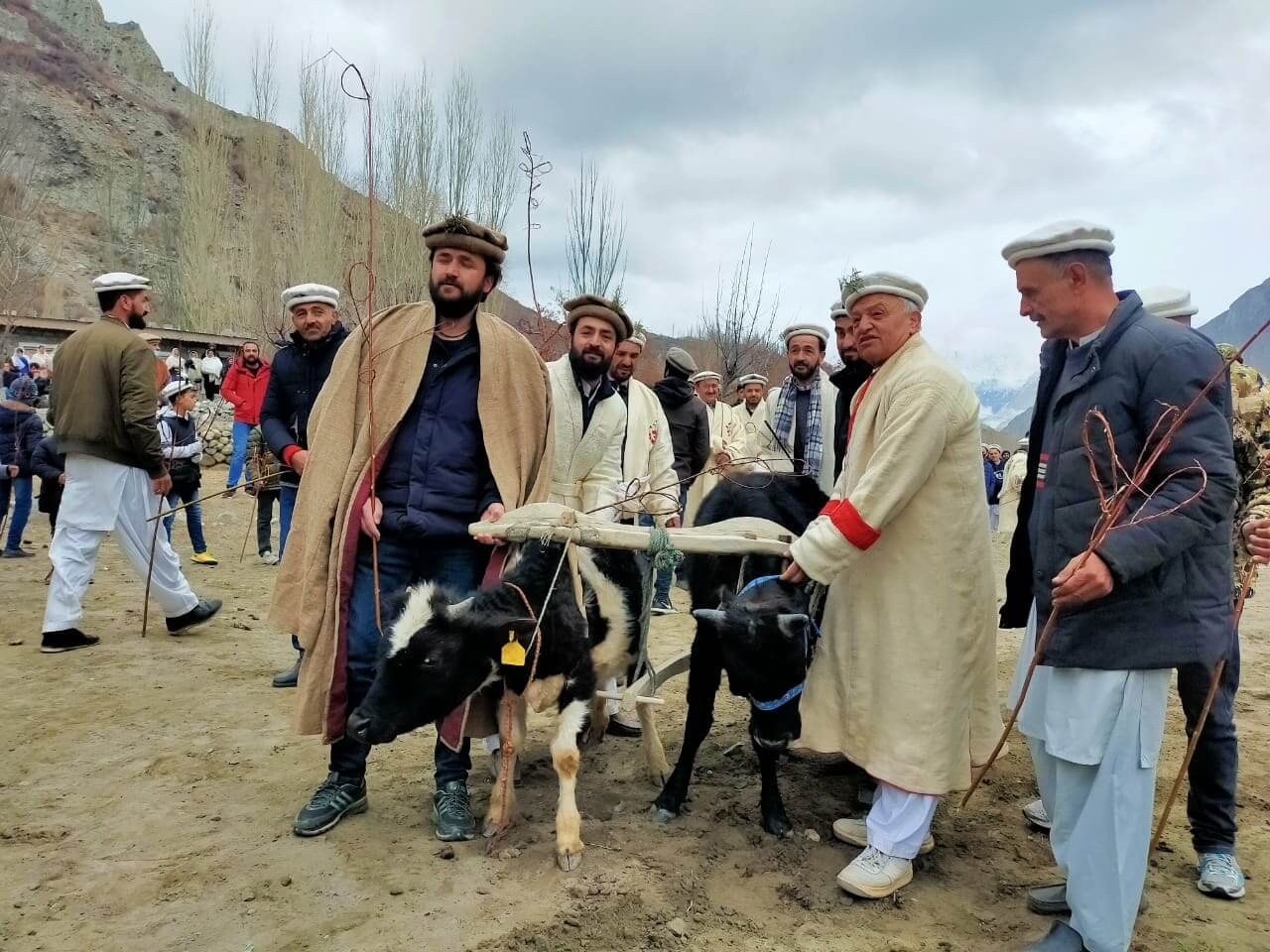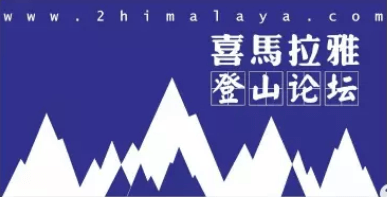General
Taghm (Spring Festival) (2025-26)
Taghm (Spring Festival) is a spectacular annual celebration conducted in Shimshal Valley, Gilgit-Baltistan, to mark the beginning of the agricultural season after a long winter. This traditional celebration, held every April 1st, brings the community together via unique rituals, cultural dances, and local cuisine, highlighting the region’s rich legacy. The Taghm Festival is more than just a celebration of spring; it also reflects Shimshal’s deep-rooted agricultural methods and strong cultural character.
The table below provides details of our fixed departures (group tours) and private tours for Festival Tours in Pakistan.
Itinerary – Taghm (Spring Festival)
The itinerary for the Taghm (Spring Festival) is given below.
Day 02: Drive to Hunza (Karimabad)
On this Day
After breakfast, you will continue your journey to Hunza through the spectacular gorges created by the Indus and Hunza rivers. This journey provides stunning views of the surrounding mountains and valleys. En route, you will stop at a spectacular site where the world's three largest mountain ranges converge: the Himalayas, Hindukush, and Karakoram. As you travel, you will be treated to panoramic vistas of towering peaks such as Nanga Parbat (8,125 m) and Rakaposhi (7,788 m), which dominate the skyline. Finally, arrive in Karimabad, the main town of Hunza Valley, and check into your accommodation for an overnight stay.
Distance: 515 kilometers, duration: 8-9 hours.
Day 03-05: Taghm (Spring Festival)
On this Day
Begin your adventure to Shimshal Valley, one of the most remote areas in the Karakoram. Begin with a two-hour jeep journey to Kuk, which is located next to the Mulungudi glacier and has hot springs. We have a great view of Dastagil Sar (7885 meters). Continue your journey to the main Shimshal Valley, where you will become immersed in the rich culture and history of this secluded community. Shimshal was founded around 900-1000 years ago by a Sufi saint, and its current population is his descendants. Overnight, you will camp at an elevation of 3,300 meters.
Tagham Festival: Every year on April 1st, Shimshal hosts a unique festival to celebrate its vibrant culture and rich traditions.
Shimshal claims to be the ideal travel destination for you, whether you are a nature lover, a traditionalist, a culture enthusiast, or a foodie. Shimshal is also renowned as the home of mountaineers. The event showcases traditional practices, dances, rituals, and local foods, all of which reflect the area's rich cultural legacy. The Taghm Festival, which includes traditional farming practices and regional cuisines such as Semn and Mul, provides a unique glimpse into Shimshal's agricultural and cultural life.
Day 06: Explore Hunza (Karimabad)
On this Day
After your stay in Shimshal, take a free day to explore the splendor of Hunza Valley. You may visit the Passu and Batura Glaciers, which are famed for their breathtaking views and tranquil surroundings. Visit the Altit and Baltit Forts, which are historical landmarks from Hunza's status as a major Silk Route station. These fortifications were initially designed to defend against Central Asian invaders. In the evening, witness a lively Hunza ethnic dance performance.
Stay overnight at your hotel in Karimabad.
Day 07: Drive to Besham/Naran
On this Day
Take an early morning drive back to Besham/Naran, following the renowned Karakoram Highway. After a picturesque drive, stop for lunch in Dassu before continuing to Besham/Naran, where you'll check into your motel for the night.
Travel time: 11 to 12 hours.
Day 08: Drive to Islamabad
On this Day
On the final full day of your journey, have breakfast before returning to Islamabad via the Karakoram Highway. On the route, you can see Taxila, a UNESCO World Heritage site that contains the ruins of the Gandhara Buddhist culture. After visiting this historical landmark, continue to Islamabad, where you'll have some free time to rest and explore. The day will conclude with an overnight stay at your hotel.
Travel time: 5-6 hours.
Day 09: Fly to home country
On this Day
After breakfast, you will be transported to the airport for your return flight, carrying with you amazing memories of your tour across northern Pakistan's breathtaking landscapes and rich cultures.
Dates & Cost – Taghm (Spring Festival)
All seasons are considered good for the Taghm (Spring Festival). Considering the inflow of tourists all year round, our dates are open throughout the year and your bookings will be 100% guaranteed even if you are a single traveler. Our prices and dates for this tour (all seasons) are given below.
| Season | Months | Tour Start Date | Price Per Person (USD) | Minimum Travellers Required | Register |
|---|---|---|---|---|---|
| Winter | Mid-November to February, 2025 | Daily | 1200 | 1 pax | BOOK NOW |
| Spring | March to May, 2025 | Daily | 1200 | 1 pax | BOOK NOW |
| Summer | June to Mid- September, 2025 | Daily | 1200 | 1 pax | BOOK NOW |
| Autumn | Mid-September to Mid November, 2025 | Daily | 1200 | 1 pax | BOOK NOW |
| Season | Months | Tour Start Date | Price Per Person (USD) | Minimum Travellers Required | Register |
Holiday Information
- Pickup from hotel or vacation rental before sightseeing
- Drop at hotel or vacation rental after sightseeing
- Guided sightseeing tour according to itinerary above
- Map (hard copy)
- Licensed professional guide (english speaking)
- SUV/mini-van/car (depending on number of people)
- Driver
- All entry/admission tickets
- Bottled water in car (fair usage policy)
- Toll & parking fees
- Drop after 10 pm (Drivers & Guide's working hours end at 10pm)
- Gratuities/tips for guides/drivers, etc
- Meals, snacks and drinks (our guide will make recommendations after consultation with guests)
- Accommodation (can be arranged at additional cost according to your budget)
- Personal travel insurance (Recommendation/Rescue Partners: Global Rescue)
- Visa to Pakistan (supporting documents can be offered if requested for multiday tours)
- Refunds in case of early tour windup/closure due to any reason
- Anything not mentioned in inclusions
Overview – Taghm (Spring Festival)
The Festival is a traditional cultural event conducted yearly on April 1st in the isolated Shimshal Valley of Hunza, Gilgit-Baltistan. The festival symbolizes the start of the agricultural season after a long, severe winter. It is an important occasion for the local community because it marks the beginning of farming activities such as irrigation and planting. Shimshal residents, who have kept this practice alive for decades, celebrate Taghm with fire and excitement, bringing families and communities together to appreciate their agricultural heritage.
The celebration features vivid rituals, customs, and traditional delicacies that reflect the region’s unique cultural tapestry. One of the most important aspects of Taghm is the creation of local meals such as Semn (a traditional bread), Mul (a grain dish), and Bath (a sweet cuisine), all of which are meticulously cooked by the villagers. The Tumang is the festival’s most thrilling event, in which the Shogun Putuk tribe, who are regarded as the farming season’s initiators, conducts a symbolic ceremony. They set fire to Yarz plant leaves and sprinkled wheat seeds on the roof of an old house through a ceiling opening, known as Ricin in the local Wakhi language, to mark the beginning of the planting season.
Another engaging part of Taghm is the playful and exciting bull game, in which a man dresses up and plays like a bull, amusing festival-goers with his antics. The celebration culminates with the Shogun Putuks exhibiting the traditional manner of plowing fields with bulls, which represents the start of the farming season. Children are also introduced to farming through a ritual known as Sk Spunder Khack, which ensures the transmission of agricultural knowledge and traditions throughout generations. Taghm is not just a celebration of the arrival of spring, but also a powerful peek into the community’s profound connection to the land and time-honored traditions.


